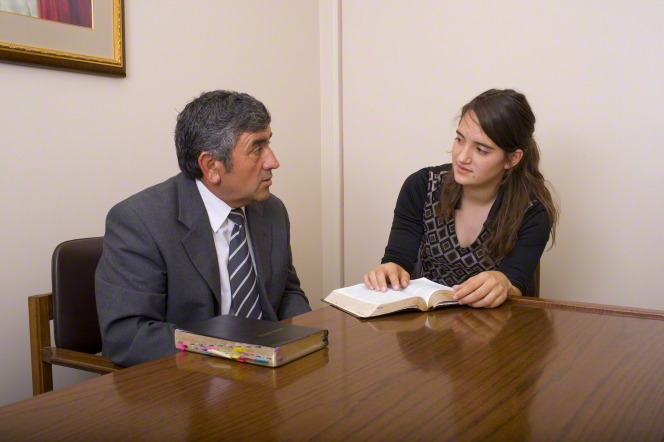Gramps,
I’ve been having a hard time understanding what to do. I went on a blind date with a guy that a somewhat close friend set me up with. She and her date came with us. After dinner, we watched a movie. They left to go on a walk. We watched the movie. We were attracted to each other and started kissing and making out. Nothing I could do stopped his advances. Now I’m not sure if I’m pregnant or not. I don’t think I am. but…what should I do? I’ve talked with my bishop. He’s disappointed but is helping me. I don’t know what to do. Please help .
Wonderinglostsheep, from Madison, Idaho
Dear Wondering,
In one sense it seems a little late to ask what to do. You’ve already done it. I’m sure that you are acquainted with the old adage–You are always free to make choices, but you are never free from the consequences of the choices you make. So, we have two issues at hand–what do we do now, and what should we have done, or how can we prepare ourselves so that we would never succumb to such a temptation again. The word, repentance, looms large at the moment. But many people get the concept wrong. They try to follow come magic procedure, like the four R’s, thinking that some ritual will take care of the matter. Rituals–set procedures with the idea that the procedure itself has some power to heal–never work. True repentance is a simple concept to comprehend, but a very difficult one to implement. The concept is couched in the following scripture—
Behold, he who has repented of his sins, the same is forgiven, and I, the Lord, remember them no more. By this ye may know if a man repenteth of his sins–behold, he will confess them and forsake them (D&C 58:42-43).
The simple concept is to confess and forsake. You seem to be well on the way, having confessed to your bishop. That is the beginning of a healing power. Those who are either too proud or too ashamed to bare their souls in revealing what they wish to keep secret will always keep it with them, and it will fester and grow until it becomes cancerous and destroys the person with respect to things of righteousness. But however difficult such a confession would be, it is the easy part of repentance. The difficult part is to forsake the sin. To forsake a sin requires a change of character. It has nothing to do with a strong willpower or the fierce determination not to repeat such an act. The need for willpower and determination demonstrate that the sin is still with the person, and the person is still struggling to overcome. So the required change of character is to become the type of person who wouldn’t be caught dead doing such a thing. That thing in reality becomes repulsive rather than attractive. Such a person is no longer tempted to recommit the sinful act. It would be much more difficult to carry out than it would be to shun it altogether.
But even that is not all there is to it. Especially if in the type of sin that you are talking about a great deal of emotion is involved–emotion driven by the natural carnal desires of the body. But there is a very effective way to keep such emotions in complete control. It is in knowing when to put on the brakes–to see and to heed the STOP sign. The thing is that if we go beyond a certain point with our emotions we become powerless to stop them. But the alarming and damaging fact is that almost everyone when involved in such emotionally charged situations feels that he has the strength and power to stop at any time. However, that is NOT TRUE. That feeling of control is a manifestation of being out of control. It’s like this: A freight train is barreling down the tracks on the approach to Boston at 70 MPH. The train has a certain weight and there is a given coefficient of friction between the wheels and the track. There is a point along the way beyond which, with full application of the brakes, the train will not be able to stop before reaching the end of the tracks and crashing into the terminal barrier. If the engineer is not aware of the conditions required to produce a full stop before the end of the track, or if he has been distracted or is not attentive to the situation at hand when he crosses the critical point, HE WILL CRASH! He may apply all the force he has to the brakes, which will only make the train overcome the contact friction between the wheels and the track and start to slide or skid, which will only decrease the braking effect; he may feel terrible for his mistake, lament his action and cry out in agony–all to absolutely no avail–the train will crash. There is only one possible solution: have an appropriate plan of action so well in mind that it’s implementation becomes second nature, and then put the plan into effect.
I think that it’s worth it at this point to give you a not-too-short example. Years ago I was required to drive rather long road trips by myself on assignment of a particular calling. As I drove I began to wonder what I would do if I were to be involved in a head-on collision. I thought that I wouldn’t be able to do much, otherwise I would be able to avoid the collision. I thought that about the only thing I could do would be to shove myself over to the right in order to avoid a direct impact with the steering wheel. So as I would drive along I would pick out a point down the road and say to myself, “That is where the collision will occur. Now, how near to that point may I get before I have to throw myself to the right?” So I would try to pick the critical point, and say “Now!”, and then throw myself (a bit) to the right. This practice went on for a couple of years. Then, you guessed it, I had a head-on collision. My family of three small children, my wife, and a guest and I were drive about 50 MPH on a straight road just at dusk approaching a narrow bridge across a stream. On the other side of the bridge the road made a curve toward the left. As we approached the bridge I noticed a car coming the other way. As it rounded the curve I became aware that it was way over on my side of the road. When this awareness came we were not more than about 30 or 40 feet from the bridge. The only thing that entered my mind before we collided was the thought, “We’re not going to make it!” Although no one was killed, we all suffered rather serious injuries, and were all hospitalized. When I was able, I went back to the car, that had been towed to the junk yard, in order to get the belongings we had left in the car. At that time I noticed several interesting things. The rearview mirror had been smashed; the only thing left of it was the support to which it had been attached, and a piece of my scalp hanging from the support. The right side of the steering wheel had been bent into the steering column, and the steering column itself was bent about four inches to the left, and I had the imprint of the steering wheel, along with a cracked rib, on my left side. What I then realized was that, as a completely automatic reaction, with no conscious decision, I had reacted exactly as I had practiced for the last couple of years–and it very likely saved my life.
So, being caught in a compromising situation with emotions running high is no time to try to figure out how to get out of it. It is far too late for such a decision to be made. What you must do is to have the plan already made and the appropriate response determined and practiced. So, you and your boyfriend are parked one evening in some lonely spot, and at the FIRST INTIMATION of an unwanted advance, your automatic response would be, “Back off, Buster, or I’m out of here in a heart beat, and you’re going to have to drive home by yourself.” It doesn’t matter if you’re 50 miles from home, or where you are; you’re out of the car in a conditioned response–and it very likely will save your life.
Gramps







